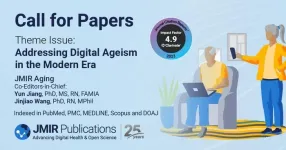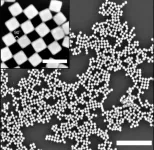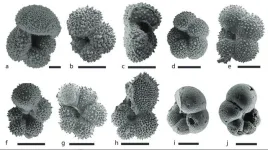(Press-News.org) Of all the polar regions, the West Antarctic Ice Sheet is the most sensitive to a warming ocean due to climate change. This is already causing a long-term ice sheet melt, and the question is how fast that melting process will take place. It may be that this enormous mass of ice already passed the tipping point, with irreversibly fast melting. This has the potential to sharply accelerate sea level rise in the near future, but the processes causing this are not yet well understood. That is why paleoclimatologists from the Faculty of Geosciences of Utrecht University have joined forces with geologists from the British Antarctic Survey (BAS), the British national institute for Antarctic research. Together, they will make reconstructions of the geological time periods with rapid global warming and fastest ice sheet melt. In doing so, they aim to better understand the underlying processes of climate-driven ice sheet melt. Did the ice sheet melt cause changes in the ocean or vice versa? And how much sea level rise is really coming our way?
Using drill cores from the ocean floor near West Antarctica, the team of scientists will investigate the ice and ocean changes during two warm periods in the Pleistocene and Pliocene, 130,000 and 3,000,000 years ago, respectively. "With a better understanding of how the climate and the ocean close to the ice sheet changed through geologic time, we can better estimate how the Antarctic ice sheet and thus global sea levels will respond to current climate change in the future," said Dr Peter Bijl, leader of the Dutch-British project. The research was made possible thanks to a cooperation agreement between the Dutch research council NWO and BAS.
Ocean floor as archive
The collaboration between the researchers from Utrecht and the United Kingdom brings together crucial and complimentary areas of expertise. Research into time periods in the past is highly dependent on the availability of drill core material: hidden deep beneath the waves lies the archive of what happened to the ocean, the ice sheet and the climate, in the form of layers of ocean floor. It contains remnants of fossil plankton, fossil molecules, and the decomposition products of the land ice. The British Antarctic Survey has been very successful in recent years in taking drill cores off the coast of the West Antarctic Ice Sheet. This has been used to collect very valuable material.
Unique expertise
In recent years, Utrecht researchers Francesca Sangiorgi and Peter Bijl, initiators of this research proposal, have developed techniques that allow them to reconstruct the ocean conditions in the Southern Ocean in detail for the geological past, using fossil plankton. "Among other things, we look at the species composition, because the presence of certain types of plankton indicates a certain seawater temperature, or specific sea ice conditions," explains Dr Sangiorgi. This is a unique expertise that has already yielded several breakthroughs in the Antarctic and Arctic climate history. "All of that data tells us something about the range of feedbacks between ocean, ice sheet and climate over timescales from centuries to millennia," Sangiorgi adds. "And the fact that we can work together with such a top institute as the BAS offers us great opportunities to make better climate reconstructions for the most pressing issues about the climate and sea level of the future."
Sand and clay
The British Antarctic Survey has a long history of research in the Southern Ocean, and has unearthed many sediment cores during numerous ocean expeditions, precisely in the region of West Antarctica that is so sensitive to climate change. While Bijl and Sangiorgi can reconstruct the ocean's past, the British researchers are experts in deducing the ice conditions. Bijl: "They do this on the basis of sedimentological measurements. The sand and clay in the drill cores are direct decomposition products of the ice sheet."
Sustainable research
In the coming years, the team will combine their expertise on these drill cores. And the researchers are very much looking forward to that. "The collaboration really has crucial added value: individually, the reconstructions are not complete and not precise enough." Moreover, the project also fits in perfectly with the new Dutch climate research into feedback mechanisms, in which five Dutch research institutions participate and which was recently also funded by NWO. "And, also not unimportant," Bijl concludes, "we are going to investigate existing drill cores and therefore do not have to go to Antarctica specifically for this. This also means that our research has a limited carbon footprint."
END
Antarctica's strongest ice melt phases of the past as a gauge of the coming sea level rise
Ice-Ocean Interactions: The History Book of West Antarctica's Climate
2024-06-13
ELSE PRESS RELEASES FROM THIS DATE:
JMIR Aging announces new theme issue on digital ageism
2024-06-13
(Toronto, June 13, 2024) JMIR Publications invites submissions to a new theme issue titled “Addressing Digital Ageism in the Modern Era” in its premier open access journal JMIR Aging, indexed in PubMed, SCOPUS, Web of Science, and DOAJ. The theme for this call was selected by the journal’s diverse audiences through a social media poll.
While digital technologies offer immense opportunities for societal progress and individual empowerment, they also bring forth new challenges, such as digital ageism. Digital ageism is discrimination against individuals based on their age within the context ...
Photonic chip integrates sensing and computing for ultrafast machine vision
2024-06-13
WASHINGTON — Researchers have demonstrated a new intelligent photonic sensing-computing chip that can process, transmit and reconstruct images of a scene within nanoseconds. This advance opens the door to extremely high-speed image processing that could benefit edge intelligence for machine vision applications such as autonomous driving, industrial inspection and robotic vision.
Edge computing, which performs intensive computing tasks like image processing and analysis on local devices, is evolving into edge intelligence by adding artificial intelligence (AI) driven analysis and decision-making.
“Capturing, processing and analyzing images ...
MD Anderson Research Highlights: EHA 2024 Special Edition
2024-06-13
ABSTRACTS: LB3439, LB3442, S131, S132, S136, S164, S222
MADRID – The University of Texas MD Anderson Cancer Center’s Research Highlights showcases the latest breakthroughs in cancer care, research, and prevention. These advances are made possible through seamless collaboration between MD Anderson’s world-leading clinicians and scientists, bringing discoveries from the lab to the clinic and back. This special edition features presentations by MD Anderson researchers at the 2024 European Hematology Association (EHA) Congress.
Triplet therapy significantly improves response rates ...
Australian solar panel recycling tech on show in Spain
2024-06-13
Australian researchers are developing solutions to recycle solar panels and recover strategic metals including silver and copper.
In Australia alone, it’s estimated more than 100,000 tonnes of solar panels will enter the waste stream by 2035, along with billions of dollars’ worth of materials that could be recaptured.
RMIT University is leading an international network of researchers working to advance the reuse and recycling of solar panels, which can contain valuable materials like lead and tin.
Thursday 13 June was the opening of a work and exhibition space at engineering company EDIPAE’s ...
Bhatia named new head of ITER projects at PPPL
2024-06-13
Ravinder Bhatia, a leader and engineer with three decades of experience managing collaborative science initiatives, is the new head of ITER projects at the U.S. Department of Energy’s Princeton Plasma Physics Laboratory (PPPL).
In this role, Bhatia oversees the design and fabrication of six diagnostic systems, or sensor systems, that PPPL is building for ITER, the multinational facility under assembly in France to study plasma that can heat itself and sustain its own fusion reactions. The diagnostics will observe the plasma within ITER to measure properties that include temperature, ...
The Davos Alzheimer’s Collaborative launches global effort to streamline diagnosis of Alzheimer’s disease and related dementias
2024-06-13
The Davos Alzheimer’s Collaborative (DAC), the global organization seeking to cure Alzheimer’s disease and dementia, today announced a new initiative in health systems in five countries to deploy blood biomarkers (BBMs) and confirmatory diagnostic testing to increase timely and accurate diagnosis of Alzheimer’s disease and related dementias (ADRD). Led by the DAC Healthcare System Preparedness (DAC-SP) team, the Accurate Diagnosis project is the first-ever global implementation research program to study the use of blood biomarkers as part of the ADRD diagnostic ...
Nanosized blocks spontaneously assemble in water to create tiny floating checkerboards
2024-06-13
Researchers have engineered nanosized cubes that spontaneously form a two-dimensional checkerboard pattern when dropped on the surface of water. The work, published in Nature Communications, presents a simple approach to create complex nanostructures through a technique called self-assembly.
“It’s a cool way to get materials to build themselves,” said study co-senior author Andrea Tao, a professor in the Aiiso Yufeng Li Family Department of Chemical and Nano Engineering at the University of California San Diego. “You ...
University of Colorado co-leads multicenter randomized trial identifying method of emergency intubation preoxygenation to decrease risk of hypoxemia and cardiac arrest
2024-06-13
In current clinical care, most critically ill adults undergoing emergency tracheal intubation receive preoxygenation through an oxygen mask. Administering supplemental oxygen to patients prior to the start of an intubation procedure increases the oxygen content in the patient’s lungs and decreases the risk of hypoxemia, low levels of oxygen in the blood. However, hypoxemia occurs during 10% to 20% of tracheal intubations in the emergency department or intensive care unit and may lead to cardiac arrest and death.
The University of Colorado co-led a trial with Vanderbilt University that compared the two most ...
Quantum data assimilation: A quantum leap in weather prediction
2024-06-13
Data assimilation is a mathematical discipline that integrates observed data and numerical models to improve the interpretation and prediction of dynamical systems. It is a crucial component of earth sciences, particularly in numerical weather prediction (NWP). Data assimilation techniques have been widely investigated in NWP in the last two decades to refine the initial conditions of weather models by combining model forecasts and observational data. Most NWP centers around the world employ variational and ensemble-variational data assimilation methods, which iteratively reduce cost functions via gradient-based optimization. However, these methods require significant computational resources.
Recently, ...
Ancient ocean slowdown warns of future climate chaos
2024-06-13
When it comes to the ocean’s response to global warming, we’re not in entirely uncharted waters. A UC Riverside study shows that episodes of extreme heat in Earth’s past caused the exchange of waters from the surface to the deep ocean to decline.
This system has been described as the "global conveyer belt," because it redistributes heat around the globe through the movement of the ocean waters, making large portions of the planet habitable.
Using tiny, fossilized shells recovered from ancient deep-sea sediments, the study in the Proceedings of the National Academy of Sciences demonstrates how the conveyor belt responded around 50 ...
LAST 30 PRESS RELEASES:
Blood test predicts which bladder cancer patients may safely skip surgery
Kennesaw State's Vijay Anand honored as National Academy of Inventors Senior Member
Recovery from whaling reveals the role of age in Humpback reproduction
Can the canny tick help prevent disease like MS and cancer?
Newcomer children show lower rates of emergency department use for non‑urgent conditions, study finds
Cognitive and neuropsychiatric function in former American football players
From trash to climate tech: rubber gloves find new life as carbon capturers materials
A step towards needed treatments for hantaviruses in new molecular map
Boys are more motivated, while girls are more compassionate?
Study identifies opposing roles for IL6 and IL6R in long-term mortality
AI accurately spots medical disorder from privacy-conscious hand images
Transient Pauli blocking for broadband ultrafast optical switching
Political polarization can spur CO2 emissions, stymie climate action
Researchers develop new strategy for improving inverted perovskite solar cells
Yes! The role of YAP and CTGF as potential therapeutic targets for preventing severe liver disease
Pancreatic cancer may begin hiding from the immune system earlier than we thought
Robotic wing inspired by nature delivers leap in underwater stability
A clinical reveals that aniridia causes a progressive loss of corneal sensitivity
Fossil amber reveals the secret lives of Cretaceous ants
Predicting extreme rainfall through novel spatial modeling
The Lancet: First-ever in-utero stem cell therapy for fetal spina bifida repair is safe, study finds
Nanoplastics can interact with Salmonella to affect food safety, study shows
Eric Moore, M.D., elected to Mayo Clinic Board of Trustees
NYU named “research powerhouse” in new analysis
New polymer materials may offer breakthrough solution for hard-to-remove PFAS in water
Biochar can either curb or boost greenhouse gas emissions depending on soil conditions, new study finds
Nanobiochar emerges as a next generation solution for cleaner water, healthier soils, and resilient ecosystems
Study finds more parents saying ‘No’ to vitamin K, putting babies’ brains at risk
Scientists develop new gut health measure that tracks disease
Rice gene discovery could cut fertiliser use while protecting yields
[Press-News.org] Antarctica's strongest ice melt phases of the past as a gauge of the coming sea level riseIce-Ocean Interactions: The History Book of West Antarctica's Climate









